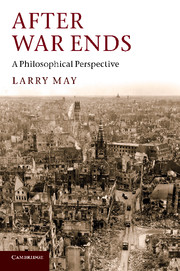Book contents
- Frontmatter
- Contents
- Acknowledgments
- Chapter 1 Introduction
- Part I Retribution
- Part II Reconciliation
- Chapter 5 Reconciliation of warring parties
- Chapter 6 Reconciliation and the rule of law
- Chapter 7 Conflicting responsibilities to protect human rights
- Part III Rebuilding
- Part IV Restitution and reparation
- Part V Proportionality and the end of war
- Bibliography
- Index
Chapter 6 - Reconciliation and the rule of law
Published online by Cambridge University Press: 05 June 2012
- Frontmatter
- Contents
- Acknowledgments
- Chapter 1 Introduction
- Part I Retribution
- Part II Reconciliation
- Chapter 5 Reconciliation of warring parties
- Chapter 6 Reconciliation and the rule of law
- Chapter 7 Conflicting responsibilities to protect human rights
- Part III Rebuilding
- Part IV Restitution and reparation
- Part V Proportionality and the end of war
- Bibliography
- Index
Summary
Reconciliation of the sort described in the previous chapter is rarely discussed in terms of the rule of law, or if it is so discussed it is to show the incompatibility of reconciliation and the rule of law. In discussions about the rule of law in transitional justice, whether in domestic or international contexts, the focus is normally on those who are perpetrators. The puzzle is to figure out how to get those who have been perpetrators, or those who might become so, instead to conform to the rule of law so that a just and lasting peace can be restored. But in addition to focusing on perpetrators, there should also be a strong focus on those who have been, or might become, mere bystanders to atrocities. In building or restoring the rule of law, it is the bystanders who are often overlooked, and yet it is they who play a significant role in the rule of law. Most significantly, bystanders form the bulk of a society and the rule of law can only exist where the bulk of the society has respect for law and does not acquiesce in the face of violence. For it is the bulk of the society, rather than the few who are perpetrators, or might become so, whose conformity to law is what glues a peaceful society together.
In this chapter, I will build on the analysis of reconciliation in the previous chapter to argue that it is respect for procedures being fair in a society, especially among current and potential bystanders to atrocities, that is the crucial normative motivation for restoring the trust necessary for the rule of law. I will draw on the Just War tradition as well as recent work concerning the rule of law in transitional societies, especially by the legal scholar Jane Stromseth, and I will also discuss the Rwandan transitional justice process known as gacaca. Whether the rule of law has been disrupted by mass atrocities such as genocide or by aggression, similar normative issues arise about how best to restore respect for law and end cycles of violence.
- Type
- Chapter
- Information
- After War EndsA Philosophical Perspective, pp. 106 - 123Publisher: Cambridge University PressPrint publication year: 2012

